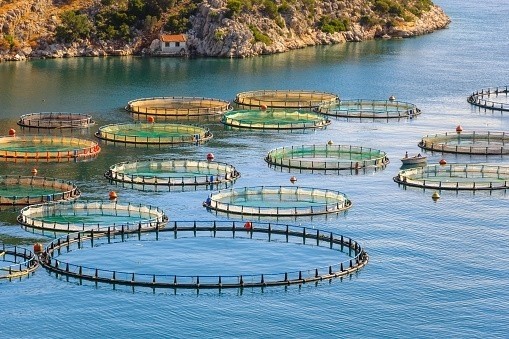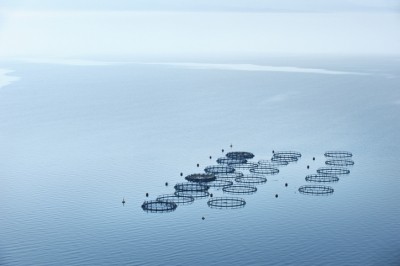Aquaculture without antibiotics: Peptobiotics closes Series A round as it seeks to tackle ‘acute’ overuse and resistance

The round was led by Hatch’s Blue Revolution Fund, with new investors including Singapore’s SEEDS Capital, France’s Seventure Partners, Australian agribusiness GrainCorp, and Farmabase – the largest animal medicine company for poultry and swine in LATAM. Participating existing investors including Trendlines Agrifood Fund, Ponderosa VC, The Yield Lab Asia Pacific, and others.
The start-up’s first product targets the aquaculture industry, renowned for its antibiotic abuse, where bacterial infections cost shrimp farmers billions in losses each year.
It will use the funding to commercialise recombinant antimicrobial peptides – these are naturally occurring bacteria inhibiting proteins that are a first line defence in the immune system of many organisms.
The human genome alone is estimated to code for more than 100 distinct antimicrobial peptide genes, with thousands more found throughout the tree of life. Antimicrobial peptides can kill bacteria as efficiently as antibiotics, but most have a different mode of action that does not lead to antibiotic resistance. Since they are produced naturally by the body, they are thought to be generally safer and less prone to potentially harmful side effects than traditional antibiotics.
Co-Founder and CEO Jonathan Bester said: “In 2023, we took our technology out of the lab and turned it into a real manufacturing process. In 2024, the Series A gives us the working capital to produce larger commercial volumes so that we can solve the industry’s disease challenges and cut antibiotics out of the food supply chain."
He told AgTechNavigator that the firm was initially focusing on the aquaculture sector due to its acute antibiotic problems.
“Compared to the rest of agriculture, aquaculture has some of the most acute problems with disease, and correspondingly sees farmers having to resort to some of the worst antibiotic abuse. So for our technology, this is an ideal use case. We get a lot of urgency from the farmers who are interested in new non-antibiotic solutions."
He added that aquaculture industry appreciated “that we are coming at this authentically with something designed to address their specific disease problems", rather than adapting a strategy lifted from the livestock industry.
“Traditionally animal health and feed additive companies treat aquaculture as a second thought to be pursued for extra revenue after they have built the product in livestock - in a lot of cases I have seen the product line for aquaculture is just the poultry or swine product dressed up with different packaging and a mark-up,” he claimed.
Cost comparison
Bester declined to comment on the exact timeline for commercialisation or about any current negotiations with industry players, but the company is confident that it can compete in terms of costs.
“One of the challenges we saw other novel ag biologicals companies having is that it can be difficult to get the production costs low enough. Part of that we have solved with our IP, and part of it has been finding the right manufacturing partners who have the experience and facilities to enable economical mass production,” he said.
Koh Jhee Hong, Co-Founder & CTO of Peptobiotics, noted: “Our breakthrough was screening through the 1000s of peptides to find the ones that could have real efficacy in agriculture, then figuring out the biotechnology innovations needed to produce them on an industrial scale at a price point acceptable to our customers."
With fish and shrimps being more exposed to the outdoor environment than most farmed animals, Peptobiotics’ near-term strategy will focus on commercialisation in these aquaculture species while developing new applications for poultry, livestock, and other markets, added Laurent Genet, Board Independent Director at Peptobiotics.
The firm undertakes the final manufacturing stages in Singapore and works with partners elsewhere for the earlier steps. For now, it does not have plans to manufacture in any other locations.
Claire Pribula, Managing Director at The Yield Lab Asia Pacific, said the latest investment was critical because antibiotic resistant strains of bacteria in fish and seafood have increased more than eight-fold in the past 30 years.
“As the world continues to shift its dependence on food harvested from the ocean and rapidly transitions to land-based highly intensive production, it will require a range of innovative solutions to ensure optimal health to achieve the highest feed conversion ratio and yield,” she said.
“Aside from the toll on fish welfare, antibiotic use, even when deployed within the regulatory standards where they exist, gets into our human food supply, facilitating the emergence of antibiotic resistant bacteria. With proven results in eliminating bacteria in shrimp, The Yield Lab Asia Pacific are pleased to once again support Peptobiotics in its quest to stop aqua, and later livestock, producers’ dependency and harmful overuse of antibiotics, and sustainably increase protein yield.”




















